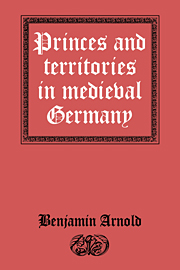Book contents
- Frontmatter
- Contents
- Acknowledgements
- List of abbreviations
- Introduction
- PART I CROWN AND PRINCE
- 1 German regal institutions and the princely order in the twelfth and thirteenth centuries
- 2 The crown, its rights, and the princes
- 3 Was there a ‘rise of territorial lordship’?
- PART II PRINCELY TITLE AND OFFICE
- PART III DYNASTIES, PRELATES, AND TERRITORIAL DOMINION
- Conclusion
- Index
1 - German regal institutions and the princely order in the twelfth and thirteenth centuries
Published online by Cambridge University Press: 03 December 2009
- Frontmatter
- Contents
- Acknowledgements
- List of abbreviations
- Introduction
- PART I CROWN AND PRINCE
- 1 German regal institutions and the princely order in the twelfth and thirteenth centuries
- 2 The crown, its rights, and the princes
- 3 Was there a ‘rise of territorial lordship’?
- PART II PRINCELY TITLE AND OFFICE
- PART III DYNASTIES, PRELATES, AND TERRITORIAL DOMINION
- Conclusion
- Index
Summary
In this chapter and the next it is proposed to present the German princes as a social order or group in their complex relationship with their suzerain and overlord, the western Roman emperor. Ever since the time of Otto the Great, German augusti had exercised the prestigious but relatively ineffective office of secular head of the entire Latin Christian world as well as their more substantial duties as kings in Germany and Italy. They commanded resources and institutions through which they were enabled to distribute substantial rewards that proved invaluable to the German aristocracy, ecclesiastical and secular. In consequence the princes were involved to a very great degree with the royal court and its policies, in spite of frequent altercations with individual kings. By the twelfth century royal policy was shaped both by established customs, methods, and ideas such as the iter or king's perambulation, ecclesiastical court service, and princely rights to royal election, as well as by newer institutions such as the Landfrieden and the Reichsfürstenstand, the Estate of princes known as principes imperii standing in immediate vassal status under the crown. But the latter made up only a small proportion of princes, so we need to ask in general: who were the German principes? The first task in chapter i is to outline their prominence as well as their legally indeterminate status, and then to see how the relationship between the crown and the princes was undergoing quite rapid change in the twelfth century. On the whole this was to their mutual advantage, in spite of frequent conflicts between the court and disaffected princes and the prevalence of violence which informed local aristocratic politics.
- Type
- Chapter
- Information
- Princes and Territories in Medieval Germany , pp. 11 - 39Publisher: Cambridge University PressPrint publication year: 1991



